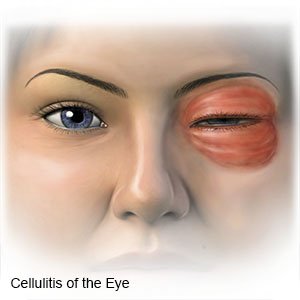Orbital Cellulitis
Medically reviewed by Drugs.com. Last updated on Aug 4, 2025.
Orbital cellulitis is a bacterial infection of your eye and the tissue around your eye. The nerves that go to the eye are also infected. Orbital cellulitis is a serious condition that can lead to blindness.
 |
DISCHARGE INSTRUCTIONS:
Call your local emergency number (911 in the US) if:
- You feel confused or more sleepy than usual.
- You develop a headache and are vomiting.
- You have a stiff neck.
Return to the emergency department if:
- You see red streaks coming from the infected area.
- You lose vision in your infected eye.
- You cannot close your eye due to swelling.
Call your doctor if:
- The red, warm, swollen area gets larger.
- Your fever or pain does not go away or gets worse.
- You have questions about your condition or care.
Medicines:
You may need any of the following:
- Antibiotics treat the bacterial infection. Antibiotics are given through an IV.
- Acetaminophen decreases pain and fever. It is available without a doctor's order. Ask how much to take and how often to take it. Follow directions. Read the labels of all other medicines you are using to see if they also contain acetaminophen, or ask your doctor or pharmacist. Acetaminophen can cause liver damage if not taken correctly.
- NSAIDs , such as ibuprofen, help decrease swelling, pain, and fever. This medicine is available with or without a doctor's order. NSAIDs can cause stomach bleeding or kidney problems in certain people. If you take blood thinner medicine, always ask if NSAIDs are safe for you. Always read the medicine label and follow directions. Do not give these medicines to children younger than 6 months without direction from a healthcare provider.
- Steroids help decrease redness and swelling of your eye.
- Take your medicine as directed. Contact your healthcare provider if you think your medicine is not helping or if you have side effects. Tell your provider if you are allergic to any medicine. Keep a list of the medicines, vitamins, and herbs you take. Include the amounts, and when and why you take them. Bring the list or the pill bottles to follow-up visits. Carry your medicine list with you in case of an emergency.
Self-care:
- Do not rub or scratch your eyes. This can increase your risk for spreading the infection.
- Place a cool, damp cloth on the area. Use clean cloths and clean water. You can do this as often as you need to. Cool, damp cloths may help decrease pain.
- Wash your hands often. Use soap and water. Wash your hands after you use the bathroom, change a child's diapers, or sneeze. Wash your hands before you prepare or eat food. Use lotion to prevent dry, cracked skin.

Prevent another eye infection:
- Wear proper safety equipment. Protect your face from injury during sports and other activities.
- Keep wounds clean and dry. Clean wounds on the face with soap and water. Cover wounds with a dry bandage if needed.
Follow up with your doctor or ophthalmologist as directed:
He or she will check if your infection is getting better. Write down your questions so you remember to ask them during your visits.
© Copyright Merative 2025 Information is for End User's use only and may not be sold, redistributed or otherwise used for commercial purposes.
The above information is an educational aid only. It is not intended as medical advice for individual conditions or treatments. Talk to your doctor, nurse or pharmacist before following any medical regimen to see if it is safe and effective for you.
Learn more about Orbital Cellulitis
Treatment options
Care guides
Further information
Always consult your healthcare provider to ensure the information displayed on this page applies to your personal circumstances.
